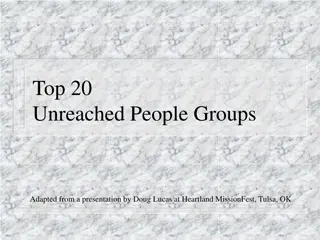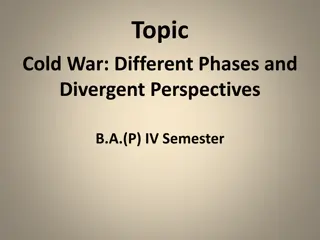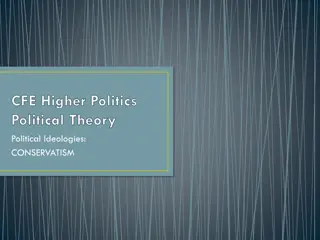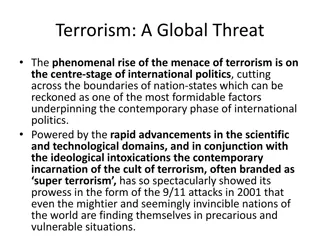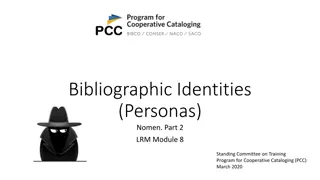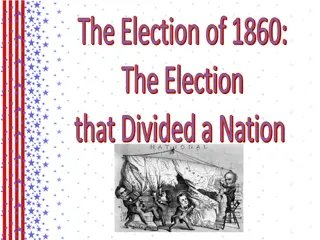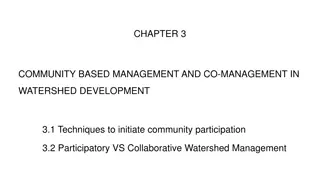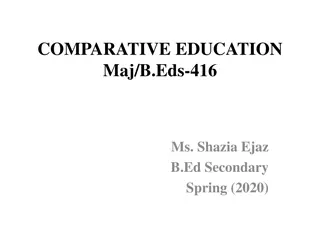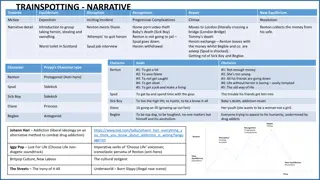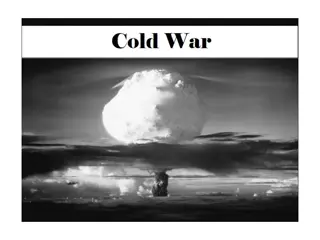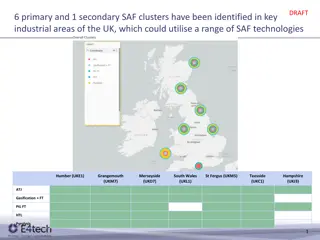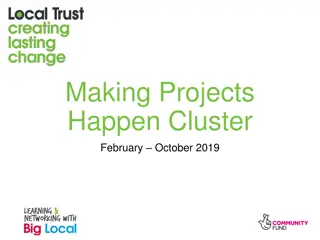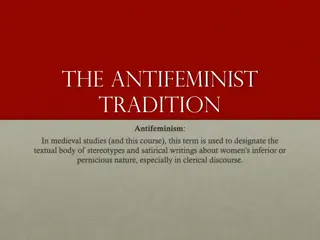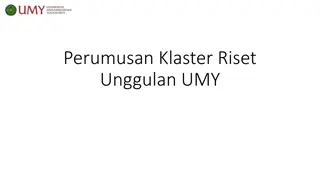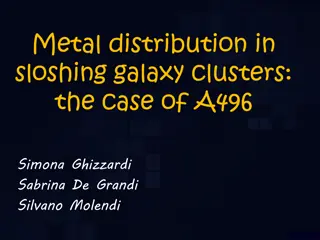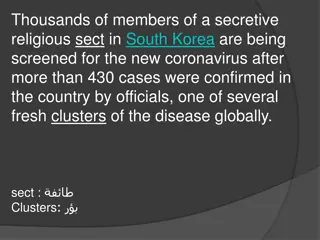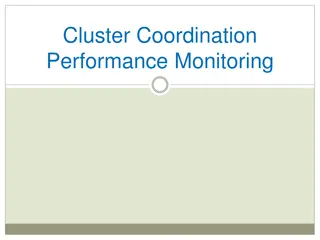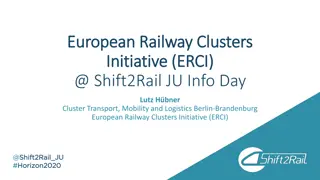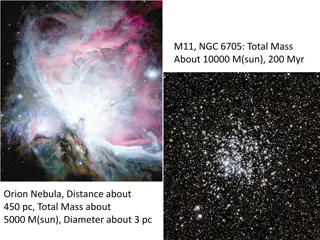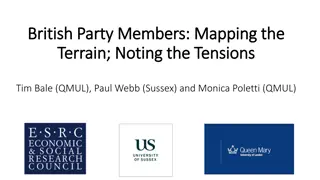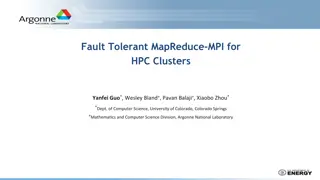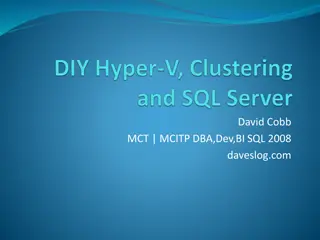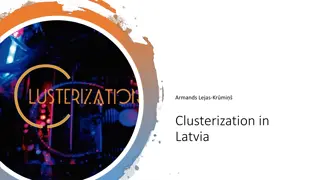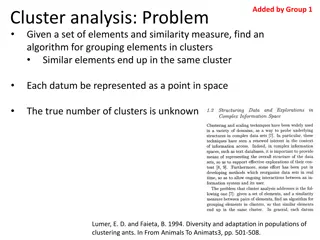Understanding Consonant Clusters in English
Consonant clusters are groups of consonants without vowels in between, found at the beginning, middle, or end of words. They play a crucial role in English pronunciation and word formation, with specific patterns and exceptions to consider. This guide provides insights into different types of conson
3 views • 18 slides
Global Challenges Faced by Unreached People Groups
The top 20 unreached people groups face significant geographical, urban, ideological, social, and people challenges. The 10/40 Window encompasses areas with the highest concentration of unreached populations. Urbanization, diverse belief systems, social issues, and the lack of Christian presence con
0 views • 37 slides
Understanding Critical Stylistics: Tools and Application
Critical Stylistics (CS) is a method that delves into the ideological underpinnings of texts through the analysis of linguistic features. Developed by Jeffries, CS focuses on uncovering implicit ideologies embedded in texts by examining stylistic choices. By integrating stylistics and critical disco
2 views • 28 slides
Understanding the Cold War: Phases and Perspectives in B.A. IV Semester
Cold War, characterized by economic, political, and military competition between the US and Soviet Union, stemmed from ideological differences leading to global conflicts and proxy wars in the Global South, ultimately fueling neo-colonialism and neo-imperialism.
1 views • 15 slides
Evolution of Modern Literature in the 20th Century
The Modern Age in literature emerged in response to the Victorian era, marked by a shift in attitudes towards life and society. Influenced by historical, economic, and ideological factors such as World Wars, capitalism, and the disintegration of empires, Modern Literature explored new themes and sty
1 views • 14 slides
Understanding Conservatism: Origins and Principles
Conservatism emerged as a reaction to the upheaval of the French Revolution, valuing tradition, security, and social order. It emphasizes the preservation of traditional institutions and stability, with roots in the beliefs of Edmund Burke. Key features include a focus on human imperfection, traditi
0 views • 21 slides
Terrorism: A Global Threat in International Politics
The rise of terrorism as a global menace is a significant factor in contemporary international politics. Fueled by advancements in technology and ideology, terrorism poses a formidable challenge, exemplified by events like the 9/11 attacks. Efforts are needed to combat terrorism on both national and
0 views • 24 slides
Understanding Bibliographic Identities and Nomen Clusters in Cataloging
Explore the concept of bibliographic identities, factors influencing the use of Nomens for individuals, and the relationship between Nomens and cataloging rules. Learn how one entity may have multiple Nomens and the significance of context in distinguishing between distinct bibliographic identities.
0 views • 12 slides
The Election of 1860: A Divisive Campaign for the Future of the United States
The 1860 election was a significant moment in American history, marked by ideological divisions and the rise of Abraham Lincoln. The Republican Party, Southern Democratic Party, Democratic Party, Northern Democratic Party, and Constitutional Union all played crucial roles in shaping the outcome. The
1 views • 14 slides
Inter-Cluster Coordination and Information Management in Humanitarian Emergencies
Inter-Cluster Coordination and Information Management play vital roles in humanitarian emergencies. The coordination mechanism involves regular meetings convened by the RC/HC and coordinated by OCHA, providing opportunities for clusters to collaborate on shared planning, needs assessments, and poole
3 views • 13 slides
Community-Based Management in Watershed Development
Techniques to initiate community participation in watershed management are crucial for sustainable development. Scholars classify participation levels into different categories, highlighting the importance of ideological motivation and voluntary engagement. The shift from direct intervention to part
0 views • 28 slides
Understanding Comparative Education: Scope and Aims
Comparative education involves studying educational theories and practices across different countries to analyze the relationship between education and society. It aims to explain educational systems, aid in the development of institutions, and form generalized statements applicable in various natio
0 views • 31 slides
Exploring Ideology and Narrative in Trainspotting
A deep dive into the narrative structure and ideological themes of the film Trainspotting, examining character goals, obstacles, and the protagonist's journey through addiction and self-discovery. The film's portrayal of addiction, socialism, liberalism, and post-Thatcherite counter-culture is explo
1 views • 7 slides
Understanding the Declaration of Independence and Colonial Perspectives
Explore the significance of the Declaration of Independence written by Thomas Jefferson and the differing perspectives of historians on the motivation behind the American Revolution. Learn about the ideological origins and beliefs of the colonists, their fears of tyranny under British rule, and the
7 views • 19 slides
The Cold War: Rivalry and Tension Between Superpowers
The Cold War, lasting from post-World War II to the 1980s, was defined by political tension and rivalry between the United States and the Soviet Union. Despite never engaging in direct military combat, both sides competed through political maneuvering and propaganda, impacting global conflicts and t
0 views • 11 slides
Sustainable Aviation Fuel (SAF) Clusters Development in UK Industrial Areas
Identified SAF clusters in key UK industrial areas show potential for utilizing various SAF technologies, with a focus on utilizing agricultural and forestry residues split between rural and industrial regions. The supply chain integration, primary conversion processes, and potential benefits for ru
0 views • 5 slides
Exploring Energy Career Clusters and In-Demand Careers
Discover the importance of a 17th Career Cluster in Energy, the focus on clean energy, and the impending retirement wave in the energy workforce. Explore the various in-demand energy careers falling under Science, Technology, Engineering, and Mathematics clusters. Unveil the Competency Model and spe
0 views • 16 slides
Gravitational Radiation Driven Capture of Black Holes in Clusters
Explore the dynamics of black hole binary formation in clusters, focusing on gravitational radiation-driven capture processes. Delve into the implications of gravitational wave emissions on orbit transitions and energy radiation. Discover critical impact parameters and approaches to understanding th
3 views • 21 slides
Big Local Learning Clusters: Making Projects Happen
Big Local Learning Clusters aim to empower residents across different areas to collaborate and learn together over a year-long period. This particular cluster focused on equipping participants with the skills and confidence needed to successfully plan and implement projects in their communities. Thr
0 views • 24 slides
Unveiling the Antifeminist Tradition: Ideological Roots, Textual Sources, and Female Nature
Explore the antifeminist tradition in medieval studies through a deep dive into its ideological roots, main textual sources, and portrayal of female nature. Discover how stereotypes and satirical writings about women's perceived inferiority have persisted throughout history, informed by clerical, in
0 views • 9 slides
Cutting-Edge Research Clusters at UMY
Delve into a diverse range of cutting-edge research clusters at UMY covering topics such as spatial forecasting, Islamic values, environmental sustainability, gender equality, and more. Explore the intersections of new media, globalization, social inclusion, and technology in addressing contemporary
0 views • 6 slides
Metal Distribution in Sloshing Galaxy Clusters: A Case Study of A496
Metal distribution in sloshing galaxy clusters, focusing on A496 cluster's XMM observations, cold fronts, spiral patterns, and Fe abundance across NNW cold fronts. Sloshing mechanisms in cool core clusters and the role of sloshing in redistributing metals are explored through analysis of metallicity
0 views • 17 slides
Global Concerns Rise as New Clusters of COVID-19 Emerge in Multiple Countries
Thousands of members from a secretive religious sect in South Korea are being screened for the novel coronavirus, part of over 78,000 global cases. Concerns heighten as clusters with unclear origins surface in countries like Singapore, Iran, and South Korea. The World Health Organization expresses w
0 views • 17 slides
Effective Partnership and Mutual Accountability in Nutrition Clusters
The content discusses the minimum commitments needed for participation in Nutrition Clusters, explains the Principles of Partnership, and explores how these principles can enhance coordination and accountability to affected populations. It emphasizes partner commitments, such as leadership, mainstre
0 views • 7 slides
Implementing Nearly Zero Energy Buildings Clusters Management Activities
The SMART4NZEB project aims to strengthen clusters for the implementation of nearly Zero Energy Buildings, funded by the European Union's COSME Programme. Activities include benchmarking analysis, training programs, strategy reviews, and communication campaigns. The project focuses on achieving Clus
0 views • 11 slides
Understanding Cluster Coordination Performance Monitoring (CCPM)
The Cluster Coordination Performance Monitoring (CCPM) is a self-assessment tool that helps evaluate cluster performance against core functions and Accountability to Affected Populations. It aims to improve coordination and accountability within clusters, developed by the IASC Sub-Working Group. Mon
0 views • 16 slides
European Railway Clusters Initiative (ERCI) Summary and Contact Information
European Railway Clusters Initiative (ERCI) focuses on increasing competitiveness in the railway industry through collaborative RDI projects, assisting SMEs in R&D strategy development, ensuring rapid market uptake, and fostering cross-fertilization with other sectors and technologies. The initiativ
0 views • 6 slides
Understanding Star Cluster Formation in Galaxies
This information delves into the formation of star clusters within galaxies, exploring parameters such as time scale, total mass, velocity distribution, and more. It discusses the evolutionary theory and presents insights on open clusters, star-forming regions, and giant molecular clouds. Various ob
0 views • 56 slides
Density-Based Clustering Methods Overview
Density-based clustering methods focus on clustering based on density criteria to discover clusters of arbitrary shape while handling noise efficiently. Major features include the ability to work with one scan, require density estimation parameters, and handle clusters of any shape. Notable studies
0 views • 35 slides
Transforming Primary Care in Scotland: A Vision for the Future
Dr. Gregor Smith, Deputy CMO, advocates for a new approach to primary care in Scotland, focusing on GP clusters and the new GP contract. The changing world demands innovative solutions, such as integrating health and social care, investing in primary care, and empowering individuals in their healthc
0 views • 16 slides
Introduction to MapReduce: Efficient Data Processing Technique
Modern data-mining applications require managing immense amounts of data quickly, leveraging parallelism in computing clusters. MapReduce, a programming technique, enables efficient large-scale data calculations on computing clusters, reducing costs compared to special-purpose machines. MapReduce is
0 views • 72 slides
Understanding the Basics of FAT File System
The FAT (File Allocation Table) file system organizes files on disk using linked clusters mapped to sectors. Directories store file information, linking clusters in the FAT table. This article explains the disk structure, boot sectors, and data allocation in the FAT system.
0 views • 44 slides
Understanding the Cold War: Origins, Consequences, and Ideological Conflicts
Explore the origins, consequences, and ideological conflicts of the Cold War through key events like the Iron Curtain, Berlin Airlift, Korean War, and Cuban Missile Crisis. Learn about communism, democracy, and the impact of beliefs and ideals on attempts to stop the spread of communism during this
0 views • 16 slides
Exploring British Party Members: Insights and Perspectives
Delve into the intricate landscape of British party members, examining ideological clusters, recruitment strategies, tensions, and reasons for leaving parties like Ex-Greens and Ex-Labour. This extensive analysis sheds light on the private versus public sector involvement, MP preferences, and the de
0 views • 9 slides
Understanding LSA Scaling and Performance in Network Service Orchestration
Explore the concepts of Link State Advertisements (LSA) and how they impact scaling, performance, and reliability in Network Service Orchestration (NSO). Learn about different cluster models, terminology, and strategies for achieving scalability with LSA, along with comparisons between LSA clusters
0 views • 26 slides
Fault-Tolerant MapReduce-MPI for HPC Clusters: Enhancing Fault Tolerance in High-Performance Computing
This research discusses the design and implementation of FT-MRMPI for HPC clusters, focusing on fault tolerance and reliability in MapReduce applications. It addresses challenges, presents the fault tolerance model, and highlights the differences in fault tolerance between MapReduce and MPI. The stu
1 views • 25 slides
Global Conflicts and Revolutions: A Historical Perspective
The turbulent events of the 20th and 21st centuries, from the aftermath of WWI with the Treaty of Versailles to the devastating Rwandan Genocide in 1994, have shaped our world through wars, genocides, and ideological clashes. The rise of leaders like Hitler, the tragedy of Pearl Harbor, the Korean W
0 views • 7 slides
Understanding Active/Active SQL Clusters for High Availability
Discover the importance of Active/Active SQL clusters for ensuring 24/7 availability of your database servers. Learn about the benefits, setup process, and the high availability solution it offers for the entire server instance. Follow a detailed step-by-step guide for setting up SQL Active/Active c
0 views • 18 slides
Clusterization in Latvia: Strengthening Collaborative Networks
Launching in 2012, Clusterization in Latvia aimed to boost collaboration among clusters through various initiatives. The Latvian Cluster Network, comprising 14 clusters with a total of 580 members, has been promoting cooperation at national and international levels. The clusters have shown significa
0 views • 11 slides
Cluster Analysis: Grouping Elements into Clusters with Similarity Measures
Given a set of elements and a similarity measure, the algorithm aims to group elements into clusters where similar elements are grouped together. Each element is represented as a point in space, and the true number of clusters is unknown. The clustering algorithm is inspired by the behavior of ants
0 views • 15 slides

